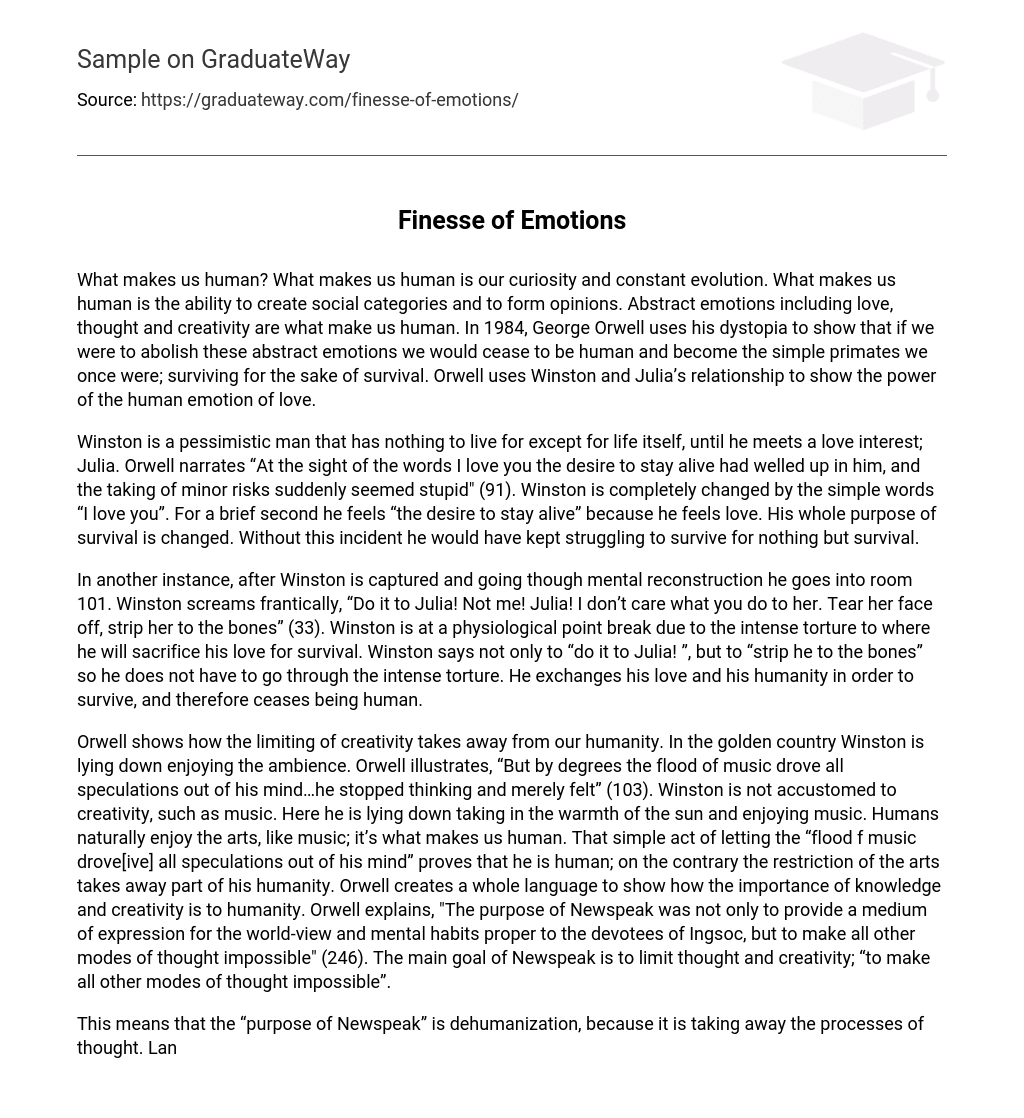What defines our humanity? It is our innate curiosity and continuous development that set us apart. Our ability to establish social constructs and shape our beliefs also constitutes human nature. Moreover, it is the presence of abstract emotions such as love, thoughts, and creativity that truly distinguishes us. George Orwell’s novel, 1984, illustrates a dystopian world where eradicating these abstract emotions would reduce us to mere primitive beings, driven solely by survival instincts. Through the relationship between Winston and Julia, Orwell highlights the overwhelming power of human love.
Winston is a pessimistic man who only sees life as something to exist in. However, this changes when he meets Julia, a love interest who has a profound impact on him. Orwell describes the moment when Winston sees the words “I love you” as a turning point in his outlook on life. Suddenly, he feels a surge of desire to continue living and realizes that taking small risks is foolish. This simple expression of love completely transforms Winston. It alters his entire reason for wanting to survive, which previously seemed futile.
During Winston’s mental reconstruction after being captured, he is taken to room 101. In a desperate frenzy, Winston shouts, “Do it to Julia! Not me! Julia! I don’t care what you do to her. Tear her face off, strip her to the bones” (33). The intense torture pushes Winston to a breaking point where he is ready to sacrifice his love for survival. By pleading for them to “do it to Julia!” and even go as far as to “strip her to the bones,” Winston hopes to avoid enduring further agony. In his desperation, he willingly gives up his love and his humanity in order to ensure his own survival.
Orwell demonstrates how the deprivation of creativity diminishes our humanity. In the golden country, Winston relaxes, experiencing the surrounding atmosphere. Orwell depicts this as, “But gradually, the abundance of music overpowered any notion in his mind… he ceased to think and simply felt” (103). Winston is not accustomed to artistic expression, such as music. In this moment, he lies down, basking in the sunlight and enjoying the music. As human beings, we naturally derive pleasure from the arts, like music; it is an integral part of our humanness. This simple act of being consumed by music proves his humanity; conversely, the suppression of artistic expression robs him of a part of his humanity. Orwell invents an entire language to underscore the significance of knowledge and creativity to humanity. Orwell elucidates, “The purpose of Newspeak was not only to provide a means of communication for the world-view and mental habits specific to the followers of Ingsoc, but also to render all other forms of thinking impossible” (246). The primary aim of Newspeak is to curtail thought and creativity; it strives to make “all other modes of thought impossible.”
The purpose of Newspeak is to dehumanize individuals by stripping away their ability to think. Language forms the foundation of humanity as it enables us to communicate and express ourselves. Without language, we would not have progressed to our current state of development. Besides facilitating basic commands, language allows us to articulate ideas and opinions. Therefore, by depriving individuals of the capacity to express themselves, we are effectively dismantling the fundamental pillars upon which humanity is built. In his work, George Orwell demonstrates the consequences of dehumanization through the manipulation of indoctrinated members of the outer party’s minds.
In a specific scenario, Winston and Julia are discussing Winston’s mother when Julia falls asleep. Orwell describes, “The Party’s horrifying accomplishment was to convince individuals that their mere impulses, their mere feelings, were insignificant, while simultaneously depriving them of any control over the physical world” (136). Orwell asserts that the party persuades people that their emotions are merely “mere feelings.” The party claims that these very emotions, which distinguish humans from savages, hold no importance.
Orwell highlights the dehumanization of party members in the re-education of Winston. According to O’Brien, “We control matter because we control the mind.” He explains that “Reality is in the skull” (218), suggesting that the party manipulates perception. O’Brien convinces Winston that his understanding of the world is irrelevant as it is solely dictated by the party. This manipulation suppresses his individuality and cognitive abilities, compelling him to adopt the party’s ideologies.
By surrendering oneself to this behavior, Winston transforms into a mere existence, a lifeless cadaver devoid of self-determination, surviving solely for the sake of survival. The most influential tools in existence are our emotions. These emotions serve not only as our navigators, but also as our commanders. The government and the media effortlessly manipulate these emotions at their will, ensuring the perpetuation of society and the promotion of various agendas, ranging from trivial consumer products like toy model cars to catastrophic acts of mass extermination. Do not allow your emotions to be dominated, as this will inevitably result in your subjugation.





